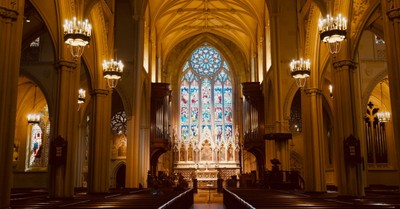Bible Pathways 10/1/2000

October 1
Matthew 1 -- 3
The birth of Jesus took place this way: When His mother Mary was espoused (betrothed) to Joseph, before they came together, she was found with child (pregnant) of the Holy Spirit (Matthew 1:18).
The amazing wise men from the east, perhaps Persia, were led by a star to Jerusalem, where they inquired: Where is He that is born King of the Jews? for we have seen His star in the east, and are come to worship Him (2:1-2). It is probable that these men had studied the prophecies of Daniel, who gave detailed explanation of the number of years that would take place when the Messiah would be born (Daniel 9:25-26). Apparently, it took the wise men some length of time after the birth of Christ to arrive in Bethlehem since we read when they were come into the house, they saw the young child with Mary His mother (Matthew 2:11). Finding the newborn King in a house as a young child rather than a babe in the manger indicates several months, possibly up to two years, after the birth of Jesus. These wise men represent the Gentile world far beyond the border of Israel saying: We have come to worship Him.
Their worship included three gifts. First, they offered gold, the most fitting gift for the King of kings, and Lord of lords (I Timothy 6:15), whose kingdom would extend throughout the world.
Then, they offered frankincense, a sweet perfume used on the Altar of Incense in the Temple to worship God. It was a fitting gift for a Priest, for this King would also be our High Priest (Hebrews 4:14) and our Intercessor (Romans 8:34) before God.
They also offered myrrh, signifying He was destined to die. It was often used as a burial spice (John 19:39). During Jesus' intense suffering on the cross, He was offered a drink mingled with myrrh to deaden His pain (Mark 15:23).
Led by the star, the wise men traveled a long distance to bring their costly gifts to worship the Messiah. In God's providence, their gifts also provided adequate resources for Joseph and Marys stay in Egypt.
Mary and Joseph remained in Egypt until the death of Herod: that it might be fulfilled which was spoken . . . by the prophet, saying, Out of Egypt I have called My Son (Matthew 2:15; Hosea 11:1). Then they dwelt in a city called Nazareth where Jesus lived until He was 30 years old (Matthew 2:23; Luke 3:23).
In those days John the Baptist came preaching in the wilderness of Judea . . . saying, Repent: for the Kingdom of Heaven is at hand. . . . they were baptized by him in Jordan, confessing their sins. . . . Then Jesus came from Galilee to John at the Jordan to be baptized by him. . . . Suddenly a voice came from Heaven, saying, This is My beloved Son, in whom I am well pleased (Matthew 3:1-17).
From that time Jesus began to preach, and to say, Repent: for the Kingdom of Heaven is at hand (4:17). To repent always means to change direction, but it is definitely more. True repentance is godly sorrow (that) works repentance (II Corinthians 7:10).
NOTE: Definitions may not agree with present-day usage as given in your dictionary; we attempt to explain the thought expressed in the original language.
Cross References:
For Matthew 1:23: See Isa. 7:14. Matt. 2:6: See Mic. 5:2. Matt. 2:15: See Hos. 11:1. Matt. 2:18: See Jer. 31:15. Matt. 3:3: See Isa. 40:3.
Prayer:
Government Official: Justice William Rehnquist · Pray for your church leaders · Pray for the Bible Pathway International Radio broadcast sponsored by Summer Institute of Linguistics, Ukarumpa, Papua New Guinea · Pray for the Arabic Bible Pathway International Radio Broadcast for the month of October sponsored by Ellenor McLarty · Country: Congo (2 million) in west-central Africa · Major languages: French and Lingala · Limited religious freedom, but government hostility has lessened · 41% Roman Catholic; 20% fetishism and belief in ancestral spirits; 17% Protestant; 9% cults · Prayer Suggestion: Ask the Lord for ways to share His love with others (Hebrews 6:10).
Memory Verse for the Week:
Hebrews 2:1

















